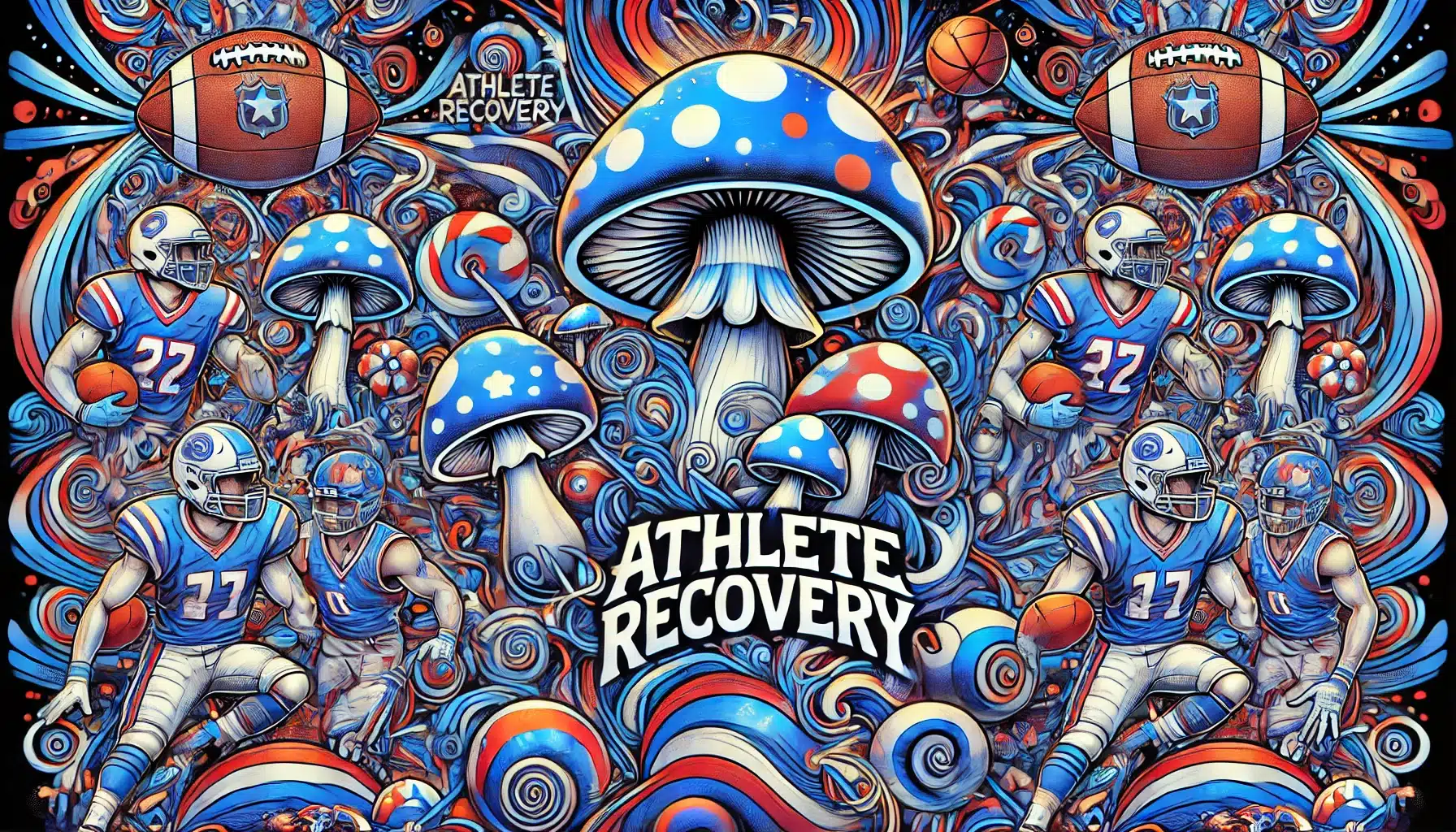

Psilocybin in Sports Medicine: Accelerating Athlete Recovery
If you don’t know by now, psilocybin is the mind-altering compound found in magic mushrooms, is making waves in an unexpected arena: sports medicine. As athletes and researchers alike explore new frontiers in recovery and performance enhancement, this natural psychedelic is emerging as a potential game-changer. But before you imagine star players tripping on the field, let’s dive into the fascinating world where ancient wisdom meets cutting-edge science.
The intersection of psilocybin and sports medicine is a relatively new field of study, but early results are nothing short of intriguing. From accelerating injury recovery to boosting mental resilience, this fungal compound is opening up exciting possibilities for athletes across all disciplines. It’s 2024. Why wouldn’t we?
A few key points about using psilocybin for accelerating athlete recovery::
- Rapid Recovery: Preliminary studies suggest psilocybin may speed up healing processes in injured tissues.
- Mental Fortitude: Athletes report reduced anxiety and improved focus after controlled psilocybin use.
- Pain Management: The compound shows promise in alleviating chronic pain without the risks associated with traditional painkillers.
- Enhanced Mind-Body Connection: Users describe a heightened sense of bodily awareness, potentially improving performance.
- Neuroplasticity Boost: Psilocybin may promote the formation of new neural connections, aiding in skill acquisition and adaptation.
The Science Behind Psilocybin and Athletic Recovery
To understand how a psychedelic compound could possibly benefit athletes, we need to peek under the hood and examine its effects on the body and mind. Psilocybin, once ingested, is converted to psilocin in the body. This molecule bears a striking resemblance to serotonin, a neurotransmitter involved in mood regulation, sleep, and pain perception.
When psilocin interacts with serotonin receptors, particularly the 5-HT2A receptors, it sets off a cascade of effects throughout the nervous system. This interaction is believed to be responsible for the compound’s psychedelic effects, but it also triggers a range of physiological responses that could be beneficial for athletes.
One of the most promising aspects of psilocybin for sports medicine is its potential anti-inflammatory properties. Inflammation is a natural part of the body’s healing process, but excessive or prolonged inflammation can hinder recovery and performance. Research suggests that psilocybin may help modulate the immune response, potentially reducing harmful inflammation without compromising the body’s ability to heal.
Moreover, psilocybin’s interaction with the brain’s pain processing centers could offer a novel approach to pain management. Unlike traditional painkillers, which often come with the risk of addiction and other side effects, psilocybin may alter the perception of pain without directly blocking pain signals. This could allow athletes to manage discomfort more effectively during training and recovery periods.
Psilocybin’s Impact on Injury Rehabilitation
When it comes to getting back in the game after an injury, athletes are always on the lookout for ways to speed up the healing process. Enter psilocybin, stage left. While it might seem counterintuitive that a psychedelic could help mend a sprained ankle or torn ligament, emerging research is painting an intriguing picture.
The potential of psilocybin to accelerate healing processes lies in its ability to influence both physical and psychological aspects of recovery. On the physical side, the compound’s anti-inflammatory properties may help reduce swelling and promote tissue repair. Psychologically, psilocybin could help athletes maintain a positive mindset during the often frustrating rehabilitation process.
Several case studies have begun to document the experiences of athletes using psilocybin as part of their recovery regimen. For instance, a professional mountain biker reported a significant reduction in recovery time from a severe shoulder injury after incorporating microdoses of psilocybin into their rehabilitation program. While anecdotal, such accounts are sparking interest in more rigorous scientific investigations.
Compared to traditional rehabilitation methods, psilocybin-assisted recovery might offer some unique advantages. While conventional approaches focus primarily on physical therapy and pain management, psilocybin could potentially address both the physical and mental aspects of injury recovery simultaneously. This holistic approach could lead to more comprehensive and possibly faster healing.
Mental Health Benefits for Athletes
The life of an athlete isn’t all glory and gold medals. The pressure to perform, constant physical strain, and the emotional rollercoaster of wins and losses can take a significant toll on mental health. This is where psilocybin’s potential truly shines, offering a beacon of hope for athletes struggling with stress, anxiety, and depression.
Psilocybin has shown remarkable promise in treating various mental health conditions. For athletes, this could translate to improved emotional resilience and better stress management. By potentially “resetting” negative thought patterns and promoting a more positive outlook, psilocybin might help athletes maintain peak mental condition alongside their physical training.
One area where psilocybin could be particularly beneficial is in managing performance anxiety. Many athletes grapple with pre-competition jitters that can significantly impact their performance. Early research suggests that controlled psilocybin use might help reduce anxiety and promote a state of flow, allowing athletes to perform at their best when it matters most.
It’s crucial to remember that mental well-being is not just a nice-to-have in athletics; it’s a fundamental component of overall performance. An athlete who is mentally resilient, focused, and emotionally balanced is likely to train more effectively, recover faster, and perform better under pressure. If psilocybin can indeed contribute to improved mental health in athletes, its impact on sports performance could be truly game-changing.
Enhancing Athletic Performance with Psilocybin
While the recovery and mental health benefits of psilocybin are exciting enough, some researchers and athletes are exploring its potential to directly enhance athletic performance. This isn’t about creating a new type of performance-enhancing drug, but rather about unlocking the body’s natural potential through improved mind-body connection and cognitive function.
One of the most intriguing aspects of psilocybin’s impact on performance is its effect on focus and concentration. Many athletes who have experimented with microdosing report increased ability to enter “the zone” – that state of hyper-focus where everything else fades away, and performance seems to flow effortlessly. This enhanced focus could lead to more effective training sessions and better performance in high-pressure situations.
There’s also growing interest in psilocybin’s potential to improve endurance and stamina. While the mechanism isn’t fully understood, some athletes report being able to push through physical discomfort more easily after psilocybin use. This could be due to altered pain perception, improved mental resilience, or a combination of factors.
Interestingly, there seems to be a connection between improved performance and faster recovery times in athletes using psilocybin. This could be due to the compound’s potential to reduce inflammation and promote healing, allowing athletes to train harder and more frequently without increased risk of injury or burnout.
Microdosing: A Promising Approach for Athletes
When it comes to incorporating psilocybin into athletic training and recovery, microdosing is emerging as a particularly promising approach. But what exactly is microdosing, and why might it be beneficial for athletes?
Microdosing involves taking very small, sub-perceptual doses of a psychedelic substance – in this case, psilocybin. The dose is typically about one-tenth to one-twentieth of a regular dose, not enough to induce a “trip” or significant alterations in consciousness, but potentially enough to produce subtle yet beneficial effects.
For athletes, microdosing could offer several advantages:
- Improved focus and concentration during training
- Enhanced mood and reduced anxiety
- Potentially faster recovery times
- Increased creativity in problem-solving (useful in strategy-based sports)
- Better mind-body connection
However, it’s crucial to approach microdosing with caution. Dosage and frequency need to be carefully considered, as even small amounts of psilocybin can have significant effects. Most microdosing protocols suggest taking a dose every three days, but this can vary based on individual needs and responses.
While many users report positive effects from microdosing, it’s not without potential risks and side effects. These can include:
- Mild anxiety or restlessness
- Changes in sleep patterns
- Digestive discomfort
- Potential interactions with other medications
It’s also worth noting that the long-term effects of regular microdosing are not yet fully understood, underlining the need for more research in this area.
Legal and Ethical Considerations in Sports
As exciting as the potential of psilocybin in sports medicine may be, we can’t ignore the elephant in the room: its legal status. Currently, psilocybin is classified as a Schedule I substance in many countries, including the United States, meaning it’s considered to have no accepted medical use and a high potential for abuse.
However, the tide is slowly turning. Several cities and states in the U.S. have decriminalized or legalized psilocybin for medical or therapeutic use. Oregon, for instance, became the first state to legalize psilocybin for therapeutic use in 2020. Internationally, countries like the Netherlands and Jamaica have more relaxed laws regarding psilocybin.
In the world of professional sports, psilocybin is still largely prohibited. Most major sports organizations include it on their list of banned substances. This creates a significant hurdle for athletes who might want to explore its potential benefits.
The use of psilocybin in sports also raises several ethical questions. Is it fair for some athletes to have access to its potential benefits while others don’t? How do we ensure safe and responsible use? Could it lead to a “psychedelic arms race” in sports performance?
As research progresses and our understanding of psilocybin’s effects on athletic performance and recovery deepens, it’s likely that sports organizations will need to revisit their policies. Some experts argue for a nuanced approach that distinguishes between performance-enhancing use and therapeutic applications for recovery and mental health.
Looking ahead, we might see the development of specific guidelines for psilocybin use in sports medicine. These could include protocols for administration, monitoring, and integration with other aspects of athletic training and healthcare. However, such developments will depend heavily on changes in legal status and continued research demonstrating safety and efficacy.
The Future of Psilocybin in Sports Medicine
As we look to the horizon, the potential of psilocybin in sports medicine seems both exciting and vast. Ongoing research and clinical trials are delving deeper into the compound’s effects on physical recovery, mental health, and athletic performance. These studies are not only exploring the benefits but also working to understand potential risks and optimal usage protocols.
One area of particular interest is the potential integration of psilocybin into mainstream sports medicine practices. This could involve supervised psilocybin sessions as part of injury recovery programs, or the use of microdosing protocols to support mental health and performance optimization. However, such integration would require significant shifts in both legal frameworks and cultural attitudes towards psychedelics.
Looking further ahead, we might see the development of psilocybin-derived compounds specifically tailored for sports medicine applications. These could potentially offer the benefits of psilocybin without some of the psychoactive effects that might be undesirable in a sports context.
The future of athlete recovery and performance enhancement could be radically different if psilocybin lives up to its early promise. We might see:
- Faster recovery times from injuries
- More effective management of chronic pain in athletes
- Improved mental health support for athletes at all levels
- New approaches to performance optimization that focus on mind-body connection
- Reduced reliance on potentially harmful painkillers and anti-inflammatory drugs
However, it’s important to temper excitement with caution. While the potential is immense, much more research is needed to fully understand the long-term effects and optimal use of psilocybin in sports contexts. Safety must remain paramount, and any future applications will need to be carefully regulated to protect athlete health and maintain fair competition.
As we stand on the cusp of this new frontier in sports medicine, one thing is clear: the intersection of psychedelics and athletics is a space to watch. Whether psilocybin becomes a staple of sports medicine or remains on the fringes, its emergence has already sparked valuable conversations about holistic approaches to athlete health and performance.
The journey of psilocybin from ancient ritual to cutting-edge sports science is a testament to humanity’s enduring quest to push the boundaries of what’s possible. As research progresses and attitudes evolve, who knows what other natural compounds might emerge as unlikely allies in our pursuit of peak human performance? The future of sports medicine is looking increasingly psychedelic, and it’s a trip that’s only just beginning.
Disclaimer: Psilocybin is a controlled substance in many jurisdictions. This article is for informational purposes only and does not endorse the use of illegal substances. Always consult with a healthcare professional and follow local laws and regulations.
Christina Perrows
Table of Contents
Canada’s Mushroom Dispensary
Calgary
We deliver magic mushrooms same day in Calgary. Enjoy quick delivery within 60 minutes anywhere within city limits between 10am and 9pm daily.
Canada
Canada's magic mushroom delivery service. We bring shrooms to your place in 1 - 4 days depending where you are in Canada. Shrooms near me? We have you covered.
Be first on the list to get notified about our sales, new genetics and drops before they sell out!

